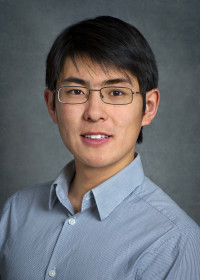
Lin Lin
Lin Lin, a faculty scientist in Lawrence Berkeley National Laboratory’s (Berkeley Lab) Mathematics Group, a mathematician in Berkeley Lab’s CAMERA Center, and an associate professor in the Department of Mathematics at UC Berkeley, has been selected to receive a prestigious Simons Investigator in Mathematics award from the Simons Foundation. Lin’s research focuses on the development of efficient and accurate numerical methods for electronic structure calculations.
The Simons Foundation’s mission is to advance the frontiers of research in mathematics and the basic sciences. A Simons Investigator is appointed for an initial period of five years, with the opportunity of an additional five years based upon an evaluation of scientific impact. The investigator receives research support of $100,000 per year; $10,000 per year is also provided to the investigator’s department, and their institution receives an additional 20 percent in indirect costs.
“I am both greatly honored and surprised to receive this award,” Lin said. “The support of the Simons Foundation will be of great help to the fundamental research my group is pursuing, especially in developing new algorithms for electronic structure calculations, including emerging tools from scientific machine learning and quantum computation.”
Lin first joined Berkeley Lab in 2011 as a Luis W. Alvarez Fellow in Computing Sciences, shortly after completing his Ph.D. in applied mathematics at Princeton University. In 2013, He was hired as a research scientist in the Computational Research Division’s Scalable Solvers Group, and in 2014 he joined UC Berkeley’s Mathematics Department faculty. He also holds a joint appointment as a faculty scientist in Berkeley Lab's Mathematics Group. In addition to the Simons award, Lin has been a recipient of a Sloan fellowship, a National Science Foundation CAREER award, a Department of Energy early career award, the inaugural SIAM Computational Science and Engineering early career award, the Presidential Early Career Award for Scientists and Engineers, and the Gordon Bell prize.
Over the past decade, Lin has made major R&D advances in developing new algorithms for electronic structure calculations in a very broad context, including Kohn-Sham density functional theory, many body perturbation theory, relativistic effects, quantum effects of nuclei, and strongly correlated quantum systems, noted James Sethian, CAMERA director, head of the mathematics group at Berkeley Lab, and professor of mathematics at UC Berkeley. Lin’s most recent work also includes developing new methods for solving high-dimensional linear systems and eigenvalue problems on quantum computers with near-optimal complexity.
“Lin has established himself as a major force in the mathematical formulation and algorithmic development of electronic structure methods across multiple applications,” said Sethian, who joined in the nomination of Lin for the Simons Foundation award. “By inventing and bringing a wide spectrum of new mathematics to computational materials, Lin is blazing new paths in difficult and important problems.”
About Berkeley Lab
Founded in 1931 on the belief that the biggest scientific challenges are best addressed by teams, Lawrence Berkeley National Laboratory and its scientists have been recognized with 16 Nobel Prizes. Today, Berkeley Lab researchers develop sustainable energy and environmental solutions, create useful new materials, advance the frontiers of computing, and probe the mysteries of life, matter, and the universe. Scientists from around the world rely on the Lab’s facilities for their own discovery science. Berkeley Lab is a multiprogram national laboratory, managed by the University of California for the U.S. Department of Energy’s Office of Science.
DOE’s Office of Science is the single largest supporter of basic research in the physical sciences in the United States, and is working to address some of the most pressing challenges of our time. For more information, please visit energy.gov/science.









